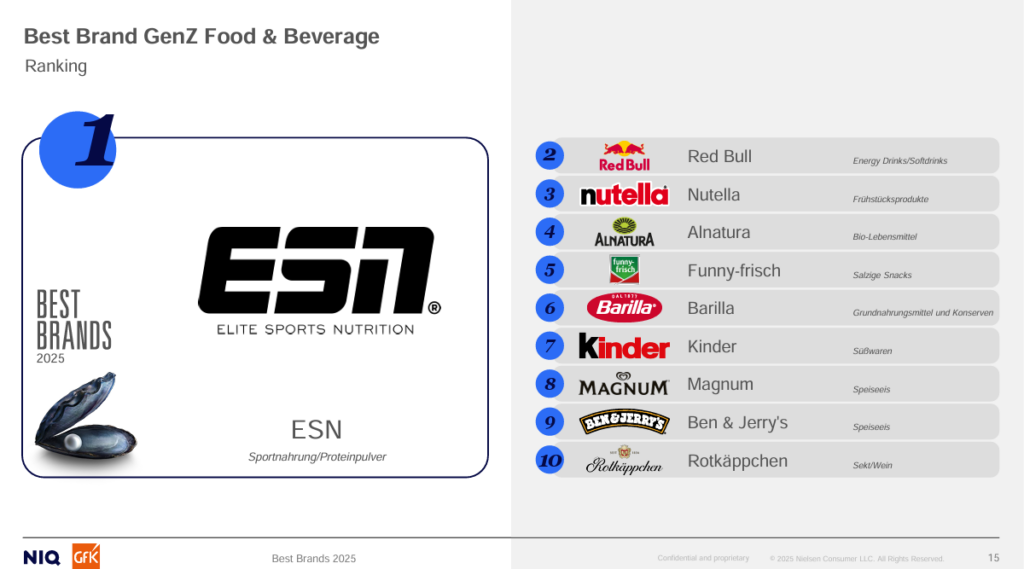The Best Brand Awards is an international competition based in Germany. Its goal is to recognise brand concepts from around the world. This year’s Best Brand Awards were presented in four categories: GenZ Food & Beverage, Luxury, Employer Brand, and Overall. Based on data from NIQ/GfK Germany, the top ten brands were selected from 500 brands across 60 industries.
The main award went to Nivea. This cosmetics brand won the overall ranking for the second year in a row, making it once again the only brand in its industry to make it into the top 10 list. Second and third place were taken by Coca-Cola and Adidas, respectively.
The Best Brands Award in the “Gen Z Food & Beverage” category was won by ESN. The sports supplement manufacturer came out on top in the 16–27 age group category. In the “Luxury” category, the winner was the luxury watch manufacturer Patek Philippe.
In addition, the Excellence Award was presented in the “Employer Brand” category. The winner in the best employer category was BMW Group. Second and third place were also taken by brands from the automotive industry.
The winners of the competition are not decided by a jury. The Best Brands Award is based on a representative study by GfK, which measures brand strength according to several criteria, including actual economic success in the market and the brand’s attractiveness in the eyes of consumers.
Brands and Gen Z
Petra Süptitz, who works as Syndicated Solutions Leader DACH at the market research agency NIQ/GfK, also focused on Generation Z in this year’s Best Brands study. She selected food and beverage brands that are most successful among members of this generation. In an interview conducted by Julia Gundelach, she explained how brands can use these findings to their advantage.
What surprised you the most about the results?
I was surprised that some of Gen Z’s favourite brands aren’t all that different from the brands popular among other generations. There are many similarities: brands like Barilla, Alnatura, and Magnum are very well received by both Gen Z and those outside of it. This suggests that generations are not as far apart as many often think. The popularity of certain long-established brands is passed down from generation to generation.
What are these brands doing right?
They keep up with the times and adapt perfectly to the spirit of the age. They address the needs and desires of Gen Z and enrich their lives with humour, joy, and entertainment—things that are important to young people. The theme of “experience” is becoming increasingly important, and these brands recognise that. And they are also pioneers in using social media.
Three-quarters of Gen Z are on social media every day. Successful brands are able to present themselves there authentically. It’s not enough just to be present and attract attention. The concept must align with the brand—and it must be trustworthy. Many brands engage in dialogue with their community, and that alone makes them authentic. Successful brands manage to reflect the lifestyle of the young generation. They represent fun and joy of life, their communication is witty and emphasises positive aspects. This is especially needed in times that aren’t exactly easy. The winning brand ESN is perfect in satisfying the young generation’s need for social recognition, status, and good looks.
There are more myths about Gen Z than about any other target group. Where did these myths come from? And why can they harm marketing?
These myths are the result of generational conflicts that have existed forever. By pigeonholing people, you make things easier for yourself in one sense, but on the other hand, it doesn’t get you very far in marketing. Pigeonholing creates stereotypes that often don’t reflect reality at all. There is no single “Generation Z.” They are all people with different backgrounds, life paths, and lifestyles. This diversity is often overlooked. Naturally, marketing strategies then fail to succeed.
It has always been that way. Even in the 1980s, we concluded through analysis that purely sociodemographic segmentation is problematic. Values and attitudes have a much greater influence on our behaviour. And thanks to new technologies, social media, and artificial intelligence, brands have more opportunities than ever before to reach people in a personalised way.
What are the most common myths about Gen Z—and what is actually true?
It is often said that Gen Z is self-centred. However, surveys show that the core values of Gen Z are largely similar to those of other generations. Yes, some topics—such as appearance, status, and individuality—are especially important to them, and egocentrism is indeed more pronounced among them than in other generations, but that does not at all mean they are selfish. Social values like tolerance, openness, and equal opportunities are more important to Gen Z than to Millennials. So, there is some “me, only me,” but it is much more strongly connected with a sense of “we” than in other generations.
 Food brands that are best received by Generation Z; Source: Best Brands 2025 Award Ranking
Food brands that are best received by Generation Z; Source: Best Brands 2025 Award RankingAnother myth: Gen Z is addicted to mobile phones and can no longer entertain themselves. Yes, digital media do play a significant role. Two-thirds of Gen Z play video games every day, and most of them are active on social media daily. However, they also seek experiences in the real world. For example, product experiences, taste, smell, and enjoyment are important to them. Brands that appeal to this experiential aspect are especially successful.
There are also many myths relating to sustainability. Does Gen Z prefer “fast fashion” or “eco-fashion”? Well, the truth is somewhere in between. Most members of Gen Z want to wear their clothes as long as possible to protect the environment, and many are willing to spend more money on sustainable fashion. By the way, Gen Z shops on marketplaces like Temu about as often as other generations. Sustainability matters to these individuals, but in a different way. They associate sustainability with lifestyle. Products must be comfortable, make life easier, be fun, and under no circumstances should they be associated with sacrifice, but rather with innovation and joy of life. The biggest success goes to cool products that inspire through the positive aspects of sustainability.
How can brands use these debunked myths? What tips do you have for successfully reaching members of Generation Z?
There is no universal approach that works. Brands should address Gen Z in an individual and targeted way. Innovation, new products, and experience are essential. Furthermore, the connection between “me” and “we” is important. This means that a product should offer not only personal benefits but also added social value. A good example in this case is Ben & Jerry’s. Sustainability is important, but there must also be an element of fun. And above all—and this is the most important point—authenticity is crucial. Brands must not bend or pander, because consumers see right through that immediately. And no generation likes that. Often, we are more alike than we realise.
Source: absatzwirtschaft.de

